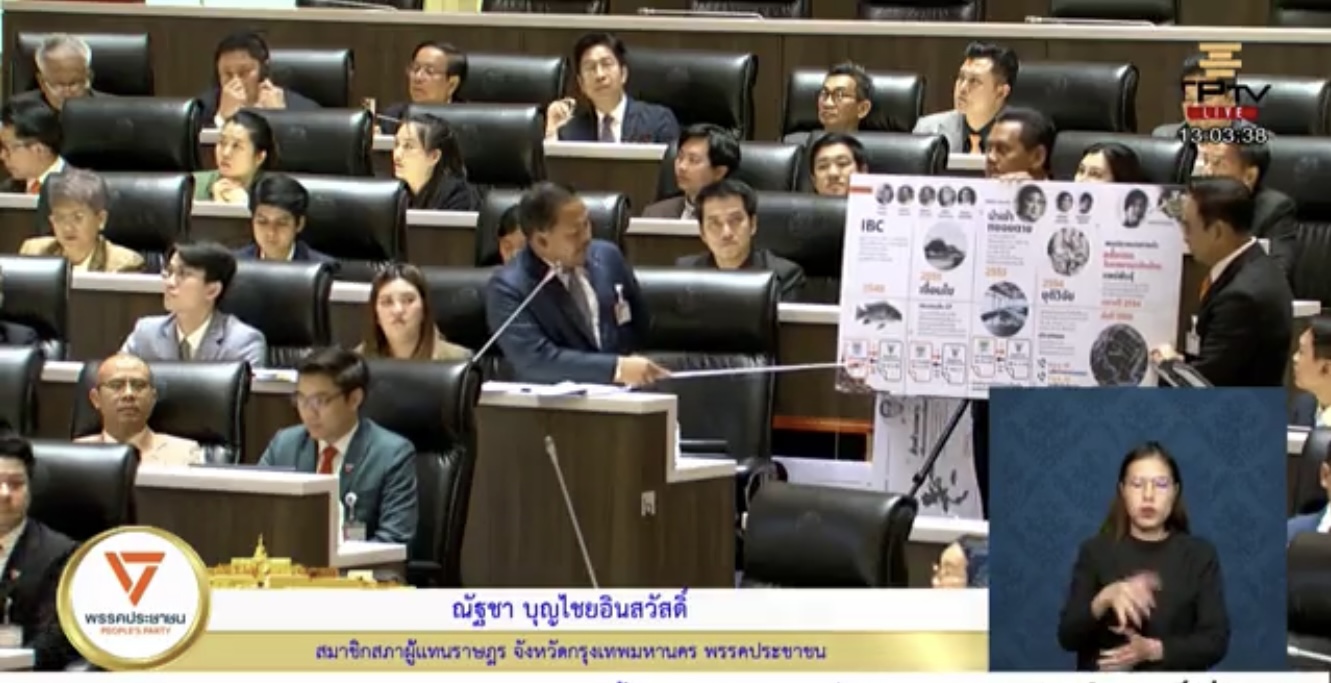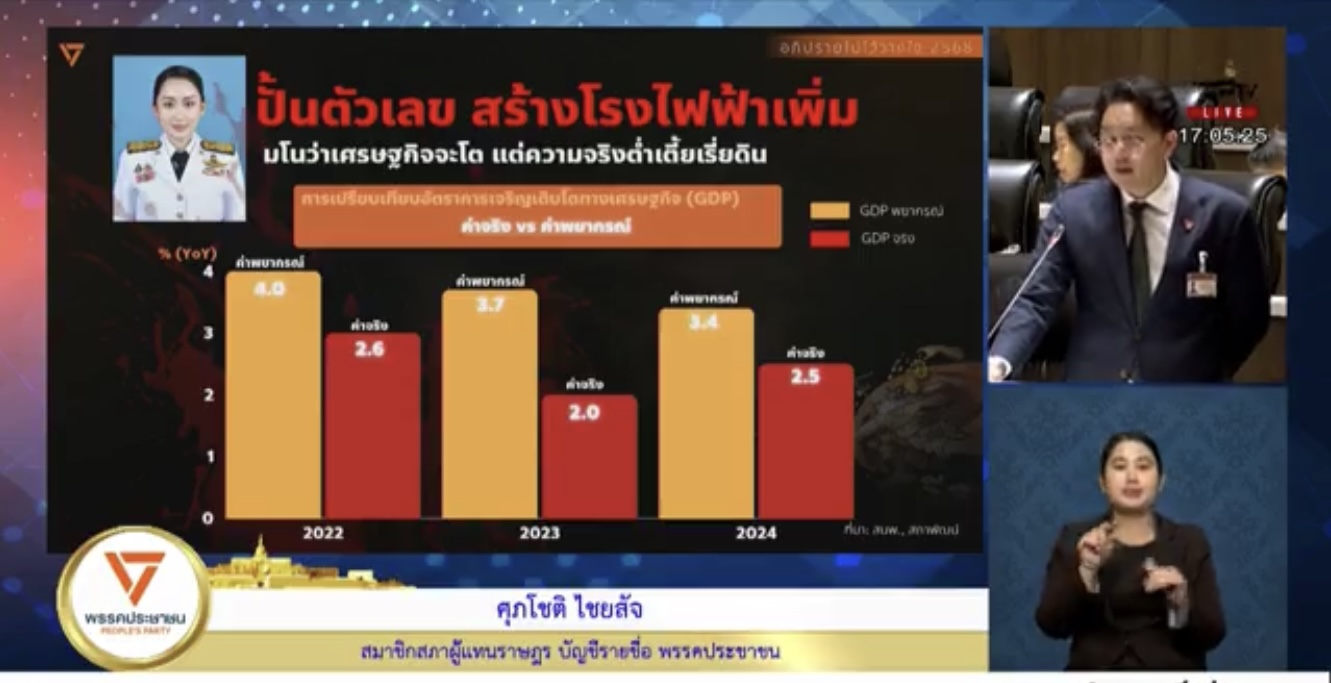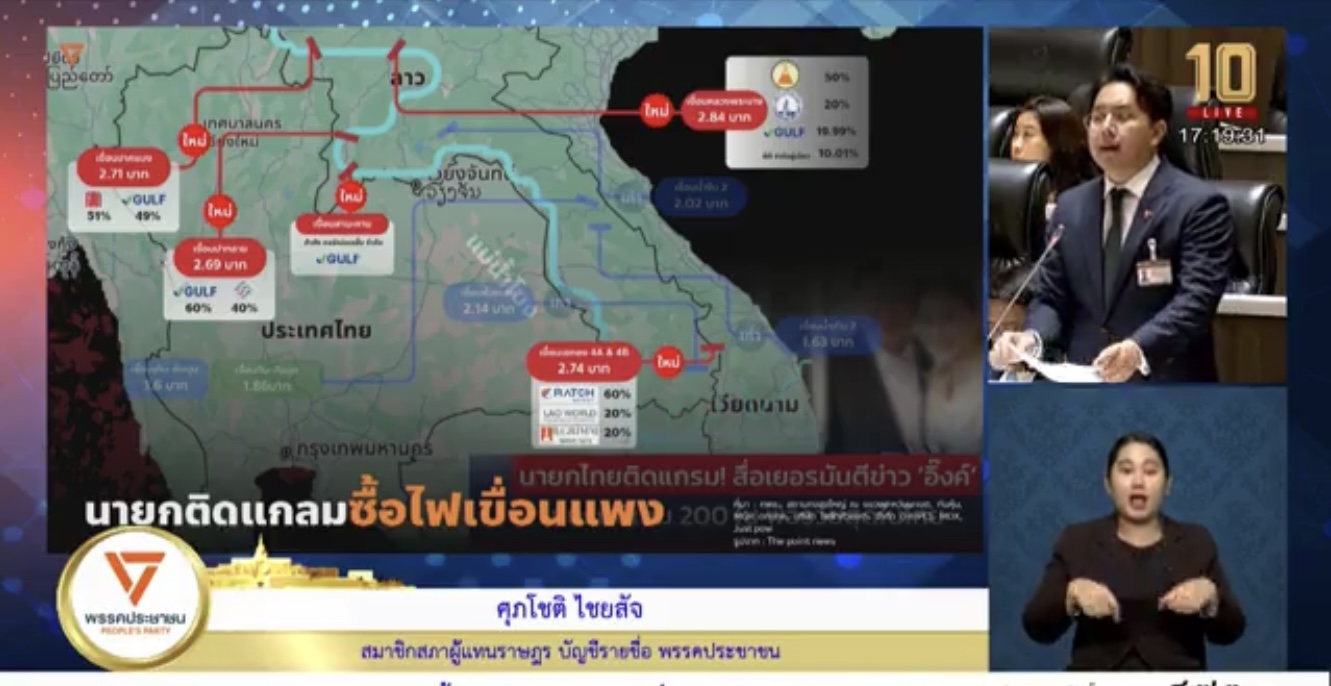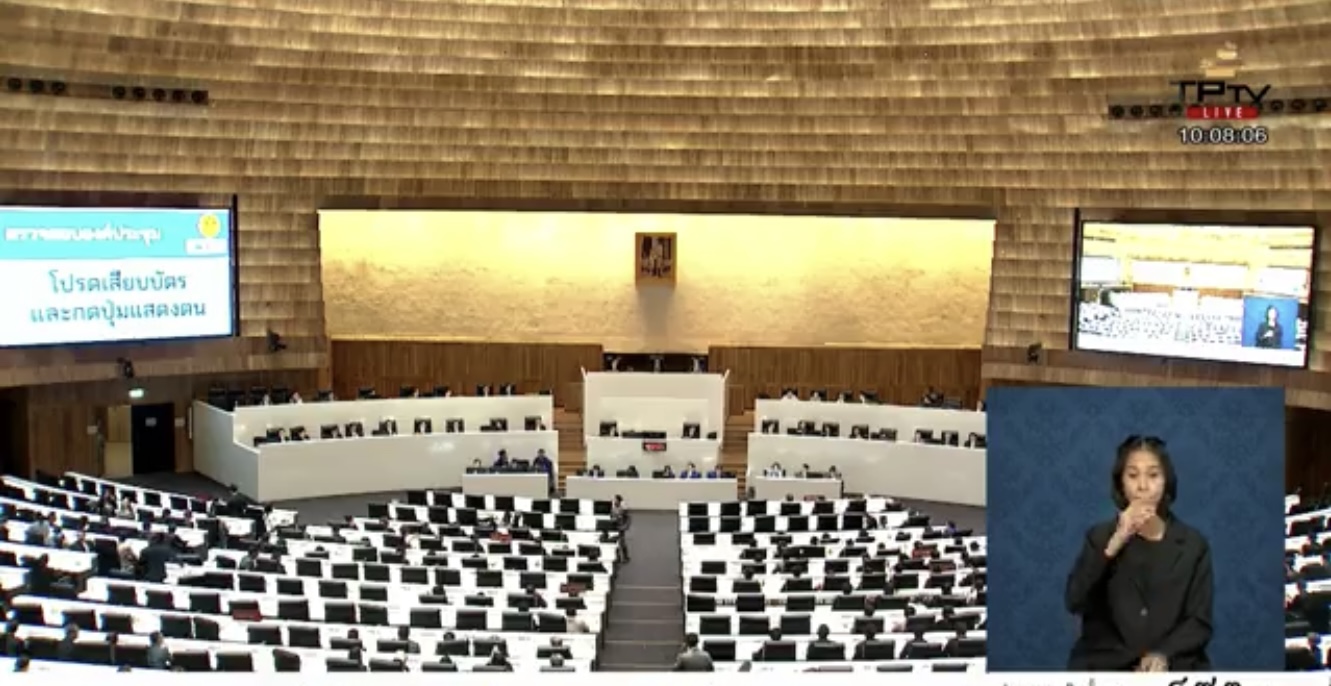PM2.5 crisis, Blackchin Tilapia outbreak, high electricity bills, and last but not least, alleged unlawful watershed encroachment by PM and her family were environmental issues, which were raised by the opposition camp in their censure motion against Prime Minister Paetongtarn Shinawatra, some of which she has just simply shrugged off
The three-day censure motion raised by the opposition mainly focused on the PM’s incompetence and dominance by her father, ex-PM Thaksin. So, issues involving her personal qualities as well as policies under her government were brought up to attack her during the two days of the debate. It was wrapped in the morning today with quick voting by 488 MPs. She survived the motion with 319 to 162 votes. Seven abstained, including the House Speakers and two vice speakers.
Since the first day, critical environmental issues were among the first that the opposition MPs picked for their motions.
Opposition MP of People’s Party from Bangkok, Natcha Boonchaiinsawat, struck at the heart of the issue of the invasive Blackchin Tilapia outbreak, asking whether the PM sides with the capitalists and the company, which has been accused of causing the outbreak, as he viewed that she and her government have not done anything critical so far to solve the problem, which is finding the culprits and demanding compensation from them.



l Credit: Parliament
He said if the PM has no idea who they are, she should study the House’s standing committee on science and technology, which probed into the case last year and produced the report that the House approved already. The report singled out the sole importer of the fish, and it was submitted to her government for consideration as well.
But according to Mr. Natcha, it has never been placed on the Cabinet’s agenda for consideration up until now. Aside from apparently ignoring the plight of local fishers, who have lost following the damage from the fish outbreaks, the PM acted in the contrary by warmly receiving another group of commercial fishery representatives on the same day when the fishers came to Bangkok to petition her, he accused.
PM Paetongtarn briefly rejected the accusation, saying she treated every group equally. However, she did not give the reason why she did not show up to receive the petition from the fishers, but instead, sent her representative to take their petition on behalf of the government.
The PM also insisted her government has done everything it can to solve the problem, which is eliminating the fish from the contaminated water sources and compensating the fishers. The previous government has already approved the first sum of the budget to clean the water sources, and her government will approve another Bt 98 million to continue the task. A new working group has also been set up to work on the fisher’s compensation, she said. No response to the MP’s key question about the culprits was made by the PM.
Read: PM criticised for being “ignorant” of fishers’ plight in Blackchin tilapia invasion case/ รายงานผลการพิจารณาศึกษา เรื่อง สาเหตุและแนวทางการแก้ไขปัญหารวมถึงผลกระทบจากการนำเข้าปลาหมอคางดำเพื่อการวิจัยและพัฒนาสายพันธุ์ในราชอาณาจักรไทย
(Updated/ Mar 27: นายกฯ สอบตก ปลาหมอคางดำ เครือข่ายประชาชนที่ได้รับผลกระทบจากปลาหมอคางดำระบุ)
PM2.5 crisis
The PM 2.5 crisis was the next issue the opposition picked to attack her. While describing the situation, People’s Party MP from Chiang Mai, Phattarapong Leelaphat, accused PM Paetongtarn of lying about the situation, not getting serious about solving the problem, and lacking leadership.
Mr. Phattarapong said her government downplayed the situation by reporting it with false indicators. Hotspots have not reduced as claimed by her government, so have burned areas, the MP said. Instead of planning in advance, her government just rushed to address the issue almost at the last minute late last year, and those measures were just rough and ill-suited to the situation. They also failed to address transboundary agricultural production and imports, which were among the prime causes of the PM2.5 haze problem, he accused.
She also lost the opportunity to address transboundary haze in a critical meeting of ASEAN last year, as it issued none of the declarations that addressed the problem, he further accused. And last but not least, the PM lacked leadership to guide proper practices among her own officials, the military included, which were reported of mistakenly conducting military practices and caused forest fires and PM2.5 haze.


l Credit: Parliament
PM Paetongtarn argued on the issue, saying her government gave importance to addressing and solving this air pollution problem. She said there was no need to issue special orders to state agencies concerned, as they all wished to help solve the problem and were ready to act without her order.
The PM then lined up her government’s measures being implemented to suppress the PM2.5 haze; ranging from the zero-burning order issued by the Interior Ministry, the increased budget and force, almost 18,000 personal, to suppress forest fires led by the Environment Ministry, the ban against agricultural burning and sugarcane residues, the clinical preparations for air pollution patients by the Public Health Ministry, and others.
“All these measures have resulted in the reduction of PM2.5 haze. It doesn’t disappear suddently, but I think we are on the right track,” claimed PM Paetongtarn.
The Disaster Prevention and Mitigation Department under the Interior Ministry issued its statement explaining the situation in detail. It revealed that the burned area in January this year was 3.82 million rai, while last year’s record stood at 1.03 million rai, meaning it increased 2.78 million rai.
But the government tried to suppress the situation and came up with the zero-burning order nationwide, resulting in the burned area in February having reduced, standing at 4.149 million rai, or a reduction by 115,905 rai when compared to last year’s record last year. Hotspots nationwide, meanwhile, are at 62,415 now, 11,285 less or 15.3% down, when compared to last year’s record of the same period of time (Jan to mid March), which stood at 62,415, the department said.
However, the most critical condition will normally start within this month in the North, where forest fires are lit up, and observers said the government needs to keep an eye on the situation from now on. Monre has issued an alert to their officials to closely monitor the situation as it’s now entered the so-called period, 60 dangerous days.
PM2.5 haze is widely acknowledged that it’s a structural problem, of which its root causes must be addressed long term. They include the vastly burned forests and numerous hotspots, the endless loop of farm life poverty and inequalities and forest and fire reliance, the unregulated free market and expansion of monocropping, and last but not least, the dysfunction of the aged bureaucratic system.
Read: PM2.5 haze season kickstarts with skyrocketing records despite state efforts to suppress it/ SPECIAL REPORT: Under the Haze I Demystifying the Flames



l Credit: Parliament
High electricity bills
PM Paetongtarn was also accused of being negligent in trying to cut high electricity bills, which resulted from excessive input of electricity in the system and government approval of new energy production projects. With or without operation, the opposition MPs said their operational costs will be included in people’s electricity bills, known as FT. Despite the fact, her government keeps approving those projects, reflecting that it rather sides with investors and developers, some of which are seen to have a close tie with her family members.
She simply denied it, saying they questioned the past government’s decisions, not hers. Her government has not yet approved any new power purchase agreements to add more electricity to the system. However, PM Paetongtarn did not explain her role as the chair of the National Energy Policy Council, which has approved several projects that will lead to an increase in the country’s energy reserve, including the controversial renewable energy projects.
Read: PM accused of owning luxurious hotel sitting on preserved watershed





l Credit: Parliament
Indie • in-depth online news agency
to “bridge the gap” and “connect the dots” with critical and constructive minds on development and environmental policies in Thailand and the Mekong region; to deliver meaningful messages and create the big picture critical to public understanding and decision-making, thus truly being the public’s critical voice


